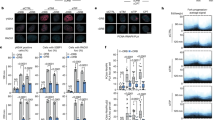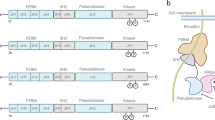Abstract
Tumorigenesis is a consequence of loss of tumor suppressors and activation of oncogenes. Expression of the mitotic checkpoint protein Chfr is lost in 20–50% of primary tumors and tumor cell lines. To explore whether downregulation of Chfr contributes directly to tumorigenesis, we generated Chfr knockout mice. Chfr-deficient mice are cancer-prone, develop spontaneous tumors and have increased skin tumor incidence after treatment with dimethylbenz(a)anthracene. Chfr deficiency leads to chromosomal instability in embryonic fibroblasts and regulates the mitotic kinase Aurora A, which is frequently upregulated in a variety of tumors. Chfr physically interacts with Aurora A and ubiquitinates Aurora A both in vitro and in vivo. Collectively, our data suggest that Chfr is a tumor suppressor and ensures chromosomal stability by controlling the expression levels of key mitotic proteins such as Aurora A.
This is a preview of subscription content, access via your institution
Access options
Subscribe to this journal
Receive 12 print issues and online access
$209.00 per year
only $17.42 per issue
Buy this article
- Purchase on Springer Link
- Instant access to full article PDF
Prices may be subject to local taxes which are calculated during checkout






Similar content being viewed by others
References
Carmena, M. & Earnshaw, W.C. The cellular geography of aurora kinases. Nat. Rev. Mol. Cell. Biol. 4, 842–854 (2003).
Katayama, H., Brinkley, W.R. & Sen, S. The Aurora kinases: role in cell transformation and tumorigenesis. Cancer Metastasis Rev. 22, 451–464 (2003).
Bischoff, J.R. et al. A homologue of Drosophila aurora kinase is oncogenic and amplified in human colorectal cancers. EMBO J. 17, 3052–3065 (1998).
Zhou, H. et al. Tumour amplified kinase STK15/BTAK induces centrosome amplification, aneuploidy and transformation. Nat. Genet. 20, 189–193 (1998).
Littlepage, L.E. et al. Identification of phosphorylated residues that affect the activity of the mitotic kinase Aurora A. Proc. Natl. Acad. Sci. USA 99, 15440–15445 (2002).
Cleveland, D.W., Mao, Y. & Sullivan, K.F. Centromeres and kinetochores: from epigenetics to mitotic checkpoint signaling. Cell 112, 407–421 (2003).
Chan, G.K. & Yen, T.J. The mitotic checkpoint: a signaling pathway that allows a single unattached kinetochore to inhibit mitotic exit. Prog. Cell Cycle Res. 5, 431–439 (2003).
Lew, D.J. & Burke, D.J. The spindle assembly and spindle position checkpoints. Annu. Rev. Genet. 37, 251–282 (2003).
Cahill, D.P. et al. Mutations of mitotic checkpoint genes in human cancers. Nature 392, 300–303 (1998).
Imai, Y., Shiratori, Y., Kato, N., Inoue, T. & Omata, M. Mutational inactivation of mitotic checkpoint genes, hsMAD2 and hBUB1, is rare in sporadic digestive tract cancers. Jpn. J. Cancer Res. 90, 837–840 (1999).
Scolnick, D.M. & Halazonetis, T.D. Chfr defines a mitotic stress checkpoint that delays entry into metaphase. Nature 406, 430–435 (2000).
Matsusaka, T. & Pines, J. Chfr acts with the p38 stress kinases to block entry to mitosis in mammalian cells. J. Cell Biol. 166, 507–516 (2004).
Stavridi, E.S. et al. Crystal structure of the FHA domain of the Chfr mitotic checkpoint protein and its complex with tungstate. Structure (Camb) 10, 891–899 (2002).
Murone, M. & Simanis, V. The fission yeast dma1 gene is a component of the spindle assembly checkpoint, required to prevent septum formation and premature exit from mitosis if spindle function is compromised. EMBO J. 15, 6605–6616 (1996).
Guertin, D.A., Venkatram, S., Gould, K.L. & McCollum, D. Dma1 prevents mitotic exit and cytokinesis by inhibiting the septation initiation network (SIN). Dev. Cell 3, 779–790 (2002).
Kang, D., Chen, J., Wong, J. & Fang, G. The checkpoint protein Chfr is a ligase that ubiquitinates PLK1 and inhibits Cdc2 at the G2 to M transition. J. Cell Biol. 156, 249–259 (2002).
Chaturvedi, P. et al. Chfr regulates a mitotic stress pathway through its RING-finger domain with ubiquitin ligase activity. Cancer Res. 62, 1797–1801 (2002).
Bothos, J., Summers, M.K., Venere, M., Scolnick, D.M. & Halazonetis, T.D. The Chfr mitotic checkpoint protein functions with Ubc13-Mms2 to form Lys63-linked polyubiquitin chains. Oncogene 22, 7101–7107 (2003).
Erson, A.E. & Petty, E.M. CHFR-associated early G2/M checkpoint defects in breast cancer cells. Mol. Carcinog. 39, 26–33 (2004).
Mizuno, K. et al. Aberrant hypermethylation of the CHFR prophase checkpoint gene in human lung cancers. Oncogene 21, 2328–3233 (2002).
Shibata, Y. et al. Chfr expression is downregulated by CpG island hypermethylation in esophageal cancer. Carcinogenesis 23, 1695–1699 (2002).
Corn, P.G. et al. Frequent hypermethylation of the 5′ CpG island of the mitotic stress checkpoint gene Chfr in colorectal and non-small cell lung cancer. Carcinogenesis 24, 47–51 (2003).
Toyota, M. et al. Epigenetic inactivation of CHFR in human tumors. Proc. Natl. Acad. Sci. USA 100, 7818–7823 (2003).
Mariatos, G. et al. Inactivating mutations targeting the chfr mitotic checkpoint gene in human lung cancer. Cancer Res. 63, 7185–7189 (2003).
Satoh, A. et al. Epigenetic inactivation of CHFR and sensitivity to microtubule inhibitors in gastric cancer. Cancer Res. 63, 8606–8613 (2003).
Ewart-Toland, A. et al. Identification of Stk6/STK15 as a candidate low-penetrance tumor-susceptibility gene in mouse and human. Nat. Genet. 34, 403–412 (2003).
Sen, S., Zhou, H. & White, R.A. A putative serine/threonine kinase encoding gene BTAK on chromosome 20q13 is amplified and overexpressed in human breast cancer cell lines. Oncogene 14, 2195–2200 (1997).
Tanner, M.M. et al. Frequent amplification of chromosomal region 20q12-q13 in ovarian cancer. Clin. Cancer Res. 6, 1833–1839 (2000).
Meraldi, P., Honda, R. & Nigg, E.A. Aurora A overexpression reveals tetraploidization as a major route to centrosome amplification in p53−/− cells. EMBO J. 21, 483–492 (2002).
Anand, S., Penrhyn-Lowe, S. & Venkitaraman, A.R. AURORA A amplification overrides the mitotic spindle assembly checkpoint, inducing resistance to Taxol. Cancer Cell 3, 51–62 (2003).
Acknowledgements
We thank D. Lim, D. Haines, E. Nigg, S. Sen, T. Takahashi, J. Cheng, R. Baer, L. Van Parijs, J. Chien and K. Minn for reagents and help; J. Woods for proofreading the manuscript; and S. Kaufmann and W. Earnshaw for suggestions. This work is supported in part by the Mayo Clinic Cancer Center and the Breast Cancer Research Foundation. J.C. is a recipient of the Department of Defense breast cancer career development award.
Author information
Authors and Affiliations
Corresponding author
Ethics declarations
Competing interests
The authors declare no competing financial interests.
Supplementary information
Supplementary Fig. 1
Tumor-free survival of wild-type and Chfr-deficient mice (from 40-80 weeks). (PDF 183 kb)
Supplementary Fig. 2
Spontaneous foci formation in Chfr-/- MEFs. (PDF 216 kb)
Supplementary Fig. 3
Chfr does not ubiquitinate Aurora B in vivo. (PDF 135 kb)
Supplementary Fig. 4
Endogenous Aurora A is ubiquitinated by Chfr. (PDF 382 kb)
Supplementary Table 1
Organs affected by tumors in wild-type and Chfr-deficient mice (40-80 weeks). (PDF 163 kb)
Rights and permissions
About this article
Cite this article
Yu, X., Minter-Dykhouse, K., Malureanu, L. et al. Chfr is required for tumor suppression and Aurora A regulation. Nat Genet 37, 401–406 (2005). https://doi.org/10.1038/ng1538
Received:
Accepted:
Published:
Issue Date:
DOI: https://doi.org/10.1038/ng1538
This article is cited by
-
CHFR promotes metastasis of human gastric carcinoma by activating AKT and ERK via NRF2- ROS axis
BMC Gastroenterology (2023)
-
A high-throughput test enables specific detection of hepatocellular carcinoma
Nature Communications (2023)
-
CHFR regulates chemoresistance in triple-negative breast cancer through destabilizing ZEB1
Cell Death & Disease (2021)
-
Five gene signatures were identified in the prediction of overall survival in resectable pancreatic cancer
BMC Surgery (2020)
-
Spatiotemporal regulation of the Dma1-mediated mitotic checkpoint coordinates mitosis with cytokinesis
Current Genetics (2019)



